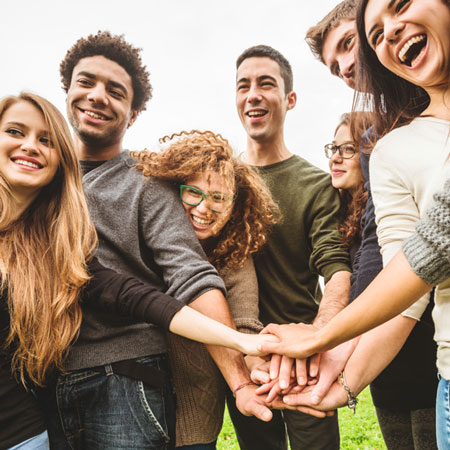Hearing is the only sense we have where others will notice when our sense has changed before we do. What's more, if we don't hear as expected they will get upset or frustrated. That's because hearing is the Social Sense, the only sense we have that is purpose-built to be shared with others.
Words. Words. Words.
Have you ever wondered how many words we hear a day?
An early study indicates that it could be well over 70,000 for some of us. And we speak an average of 16,000 a day. That's a lot of words, and rightly so. Because for over 99.9% of the world language is primarily spoken.
Yes we read. Yes we watch people's body language. Yes we can communicate with touch. But when it comes to getting across our thoughts and feelings quickly and effectively, nothing beats the efficiency and flexibility of the spoken word.
If you're not convinced, try visiting a foreign country where you have no knowledge of the native language. Very quickly you realise just how limited you've become. All that learning you have, all that experience, all that charm, wit and sophistication are lost as you find you've become a mere shadow of yourself. We need our words. Our shared language.
Somebody to listen
Human beings are social creatures. We need to be able to share what's inside of us with what's outside.
Watch a toddler trying to make themselves understood, and we see their faces crease with frustration when they can't get their words out. Listen to the anger expressed by couples when they feel they're not being listened to. Or how we consider people rude who don't pay attention to what we have to say.
We need to be listened to. It's part of our social contract with one another. That's why when another person deliberately chooses not to listen to us we consider it to be one of the highest forms of insult.
Taken for granted
And yet there is one presupposition in all of this that tends to get overlooked: that spoken language absolutely 100% assumes that hearing is present.
But more than this:
We expect people to hear us first time, accurately.
So strong is this simple assumption – that others will hear us first time, accurately – that whenever conversation doesn't just flow, it is completely unexpected. Our social contract has been broken—that sudden and abrupt interruption in the flow leading to frustration, anger and increased strain on our relationships.
Keeping the flow
Each of us therefore has a duty to do all we can to maintain the flow—by keeping our own hearing working as others expect it to. Because our hearing is every bit their hearing. It is the Social Sense.
Of course, if we genuinely cannot maintain the flow ourselves, we should be able to expect society to support us, by finding out how best to connect with us. That too is our social contract. But we should never let that be an excuse for not honouring our own side of the social contract in whatever way we can. We must always remembers what it is like when others do not hear us first time, accurately.
Playing our part
So how do we honour our side of the contract?
By keeping our own hearing working at its best: prepared, empowered, protected. And by demonstrating practical understanding when we encounter those who are unable to hear us first time, accurately.
Because it is our connections that enable us as individuals to live beyond ourselves and society to evolve.
